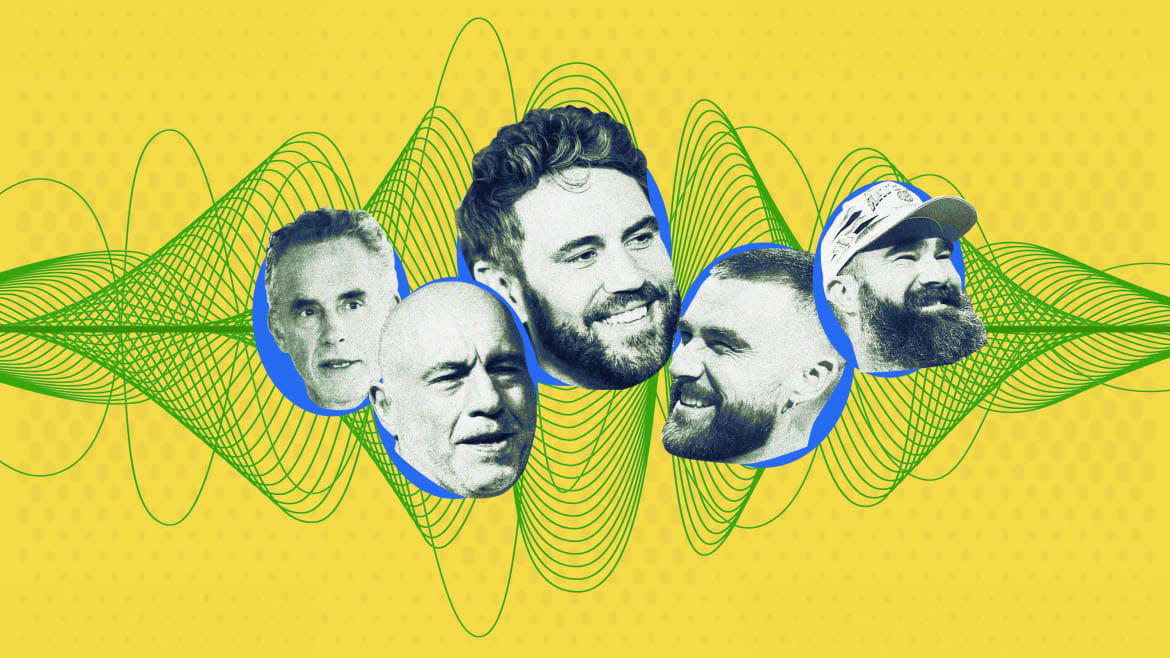Opinion: Podcast Monologuing Is the New Mansplaining

Close your eyes, hold your breath for a moment and you can almost hear it. Even if your iPhone isn’t hooked up to your Bluetooth speaker, it’s in the ether—the buzzing hum of thousands of podcasters all across the country, breathlessly monologuing into their freestanding microphones.
In 2024, podcasts feel more inescapable than ever, and audience statistics reflect this. According to a report this year on podcast consumption in the United States by Edison Research, podcasts now represent 11 percent of daily time spent with audio media.
Furthermore, the report said, another piece of data analysis this year found that men are more frequent podcast listeners, but only by a slim margin: 45 percent of women listen to podcasts monthly, and 32 percent of women listen to podcasts weekly. In other words, podcasting is not exactly the bro-centric medium that many believe.
It’s an understandable misapprehension though, given that the podcasting boom has led to a kind of droning, perpetually flat, self-perpetuating pattern of speech among its practitioners that’s distinctly different from the dulcet tones we used to hear on the radio. We’ve come a long way from The War of the Worlds to love language TikTokers.
Podcasting is the perfect medium for people who largely just want to hear themselves talk. This might seem an obvious truth, but it’s especially glaring when you consider the sheer length of the most popular shows on Apple and Spotify.
It’s rare to find an episode of The Joe Rogan Experience that clocks in under two hours, with many episodes ballooning beyond the three-hour mark (including last year’s misinformation-filled sit-down with Robert F. Kennedy Jr.) The same goes for Rogan imitators like Theo Von and Andrew Schulz. Even the Kelce brothers manage to talk for hours on end about not all that much.
One particularly egregious example is The Viall Files, ex-Bachelor star Nick Viall’s popular interview—and monologuing—podcast.
Viall was born for reality TV, and for the podcasting medium. Handsome, charismatic and long-winded to the point of verbosity, Viall waxes condescendingly about anything and everything; his terse, patronizing dressing-down of Vanderpump Rules’ Tom Sandoval for the latter’s tardiness on a fairly recent episode is a good example.
Peak podcast monologuing can also be found in the episode in which Viall and his wife, surgical technologist and model Natalie Joy, recount their recent nuptials in excruciating detail. A full 23 minutes of the three-and-a-half-hour-long episode are spent discussing the wedding’s welcome party theme alone. Not the theme of the wedding, but the theme of the welcome party.
“When it came to our wedding, I knew of a handful of the details, but when it came to the wedding party, I knew we had a mechanical bull, but I didn’t really know much, so I walked in and I was just like, over the moon, just being like, ‘Oh my god, this is such a cool—welcome to our party, this is the greatest party of all time,’” Viall begins.
Here, the host (who perhaps doesn’t deserve to be singled out in this manner, as so many podcasters are guilty of this) demonstrates one classic indicator of podcast monologuing: endless run-on sentences.
In conversations around dinner tables or at bars, stories are told most effectively when they’re condensed and layered with humor. Brevity is the soul of wit, after all. On podcasts, the longer and more boring the story is, the better: any dialogue that can trundle on inoffensively in the background while the listener does something else is a win.
There are exceptions, of course. I happen to be a huge fan of The Bald and the Beautiful, the joint podcast co-hosted by ex-Drag Race competitors Trixie Mattel and Katya Zamolodchikova, despite having barely watched the original competition show and only semi-frequently having any idea what my two faves Trixie and Katya are talking about.
A recent episode, however, featured Katya’s return after a recent stint in rehab, and I actually sharpened my brain enough in order to pay attention, rather than—as I sometimes do—turning the volume down enough so that their chatty voices can lull me to sleep. (Anything can be background noise, even two performers with extremely loud and distinctive laughs.)
Over the years, I’ve followed Katya’s journey as she’s openly discussed her struggles with mental health and addiction, and have found her insights into the human condition hilarious and moving.
These are podcasts at their best: intimate, arresting, personal and unfathomably silly. When they’re done well, even podcasts of ridiculous length can be fully engaging. Take Acquired, the business-oriented show in which the two hosts take up to four hours at a time dissecting, in exhaustive detail, the corporate origins of a wide spectrum of companies, from Hermès to Microsoft. Fascinating!
There has to be some podcast microphone regulations. pic.twitter.com/kHsYHOQQGW
— Kevín (@KevOnStage) February 16, 2024
What’s less fascinating, sadly, are the endless droning hordes filling our airwaves with the millionth show about how monogamy isn’t realistic for men, or about astrology, or about how eating an all-meat diet is the only solution to male pattern baldness; or whatever the fuck Jordan Peterson is talking about this month.
The hard truth of the matter is that just because every person in the world could theoretically buy a microphone at Best Buy and start a podcast doesn’t mean that even 1 percent of them would be worth listening to.
That’s why, whenever some new TikTok dance, Andrew Tate-ism or “coquette bow” mini-trend springs up or gets discussed on a podcast, my first thought always has been—and will remain—why are we listening to these people?
Comedians Line Up to Help RFK Jr.’s Misinformation Campaign
Get the Daily Beast's biggest scoops and scandals delivered right to your inbox. Sign up now.
Stay informed and gain unlimited access to the Daily Beast's unmatched reporting. Subscribe now.


